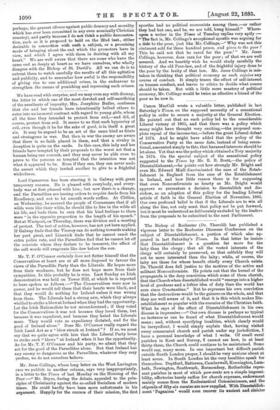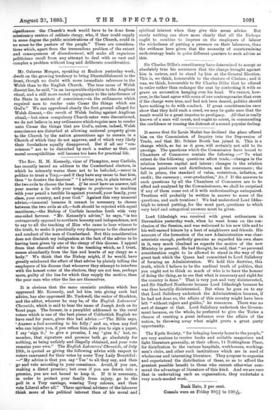The Bishop of Rochester (Dr. Thorold) has published a vigorous
letter to the Rochester Diocesan Conference on the subject of Disestablishment, a portion of which also ap- peared in last Saturday's Times. In that letter he insists that Disestablishment is a question far more for the laity than the clergy ; that all the vested interests of the clergy will certainly be preserved, so that selfishly they will not be more interested than the laity ; while, of course, the laity are those for whose benefit chiefly every Church exists. Dr. Thorold does full justice to the motives of the active and militant Nonconformists. He points out that the kernel of the propaganda is the deep conviction which some of them cherish, that the Church when disestablished would " emerge into a higher level of goodness and a loftier idea of duty than the world has seen since Constantine." But he expresses his own conviction that the destructives would be the gainers on the whole, and that they are well aware of it, and that it is this which makes Dis- establishment so popular with the enemies of the Christian faith. What he says of the effect of Disestablishment in his own diocese is impressive :—" Our own diocese is perhaps as typical an instance as can be found of what Disestablishment would mean ; and, without specifying localities, which clearly would be inexpedient, I would simply explain that, having visited every consecrated church and parish under my jurisdiction, I have a personal knowledge of what I write. Of small rural parishes in Kent and Surrey, I cannot see how, in at least thirty-three, the Church could continue to be maintained. Some would say, many more. In one important but difficult parish outside South London proper, I should be very anxious about at least seven. In South London let the very localities speak for themselves. Deptford, Battersea, Camberwell, Kennington, Lam- beth, Newington, Southwark, Bermondsey, Rotherhithe repre- sent parishes in most of which pew-rents are a simple impossi- bility, offertories barely suffice for church expenses, endowment mainly comes from the Ecclesiastical Commissioners, and the stipends of fifty-six curates are now supplied. With Disestablish- ment `Paganism' ' would soon recover its ancient and sinister
significance the Church's work would have to be done from missionary centres of celibate clergy, who, if they could supply in some degree the public ministrations of the Church, could in no sense be the pastors of the people." These are considera- tions which, apart from the tremendous problem of the extent and consequences of disendounnent, will make all sagacious politicians recoil from any attempt to deal with so vast and complex a problem without long and deliberate consideration.



































 Previous page
Previous page